
Trail of the Ancients Scenic and Historic Byway

Sleeping Ute Mountain, from the north
The Anasazi dominated the Colorado Plateau for hundreds of years but left little record of their civilization. Lots of ruins, cliff dwellings, rock art, pottery shards, yes, but no indicators as to how they lived, who they were, what they believed. This area contains dense clusters of Anasazi remains and the Anasazi Heritage Center in Dolores offers background and interpretive information. One branch of the byway connects with Utah's Trail of the Ancients in the Four Corners Area.
The Trail of the Ancients travels through the archeological heartland of America. The earliest inhabitants of this area were hunter-gatherer nomads, people who sustained themselves by hunting big game and gathering whatever edible vegetation they could. There are indications that they lived here as long as 12,000 years ago.
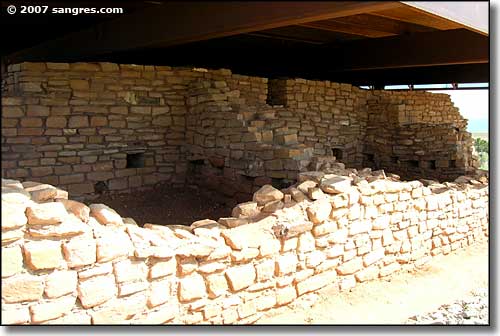
Lowry Pueblo
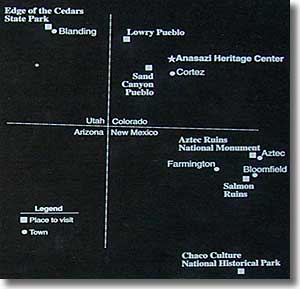
The Ancestral Puebloans (the folks usually meant by "Anasazi") became established in the Four Corners area about the time of Christ and were predominant here until about 1300 CE. They developed a stable farming life around large communities and established a rich cultural mosaic that still survives among the modern Pueblos.
The Ute Indians also called this region home, although they were also hunter-gatherers who wandered around a much larger expanse of Colorado, Utah, Arizona and New Mexico. When they were confined to federally designated reservations, their lifestyle turned more to ranching.
This vast area is also called home by the Diné (folks also known as Navajo) but they came into the area about the same time that the Spaniards were conquering Mexico.
Today, you'll find the Four Corners Monument, the Ute Mountain Ute Reservation and the Navajo Reservation here. Hovenweep National Monument is also here, as is Mesa Verde National Park. In Cortez is the Cortez Cultural Center, a forum for education, arts and culture with interpretive exhibits on Ancestral Puebloans, the Ute Mountain Utes and the Navajo's. Memorial Day through Labor Day, the Center also holds Native American Dances and in-depth Native American cultural programs.

The Anasazi grew beans, too, but not like this
Near Dolores is the Anasazi Heritage Center, a museum for interpreting the Four Corners region's history and culture. The Center has a hands-on Discovery Area with educational programs, permanent exhibits and films exploring local archaeology and history and the Ute, Navajo and Pueblo ways-of-life. The Center has over three million southwestern Colorado artifacts available for research. There are also 2 excavated pueblos on site to explore.
Northwest of Cortez is the Crow Canyon Archaeological Center which, in the summer time, provides full-day programs of research and education exploring the world of the Ancestral Puebloans through site tours of a working excavation coupled with hands-on activities.
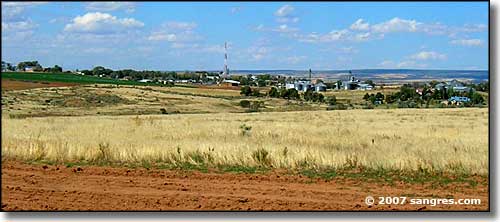
Pleasant View
Further northwest, near Pleasant View and then southwest on Highway 10, is the Lowry Pueblo, constructed in the twelfth-century and containing 40 rooms and 8 kivas. This pueblo is a mix of Chacoan and Mesa Verde building styles. A little further down the road west and straddling the Utah-Colorado state line is Hovenweep National Monument. There are 6 Ancestral Puebloan sites here, all built around 1200 CE and characterized by their unique circular, oval, square and D-shaped stone towers. While most of the sites require back-road travel and some hiking, Square Tower site is easily accessible.
South of Cortez is the Ute Mountain Tribal Park, which is operated as a primitive area to protect its' cultural and environmental resources. Because it's a primitive area, self-guided tours are not allowed but the guided tours are run by tribe members who really know their stuff when it comes to the Ute and Ancestral Puebloan cultures.
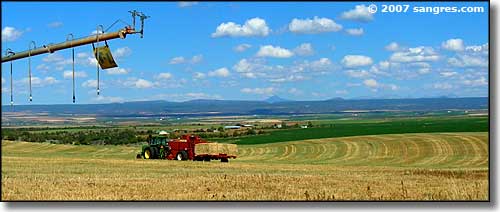
Near Yellow Jacket
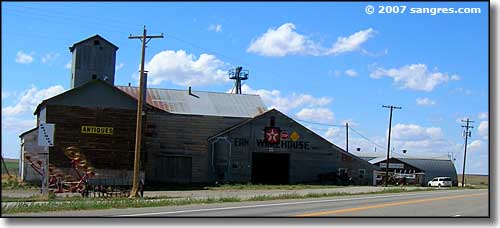
Near Lewis

Escalante Pueblo, at the Anasazi Heritage Center
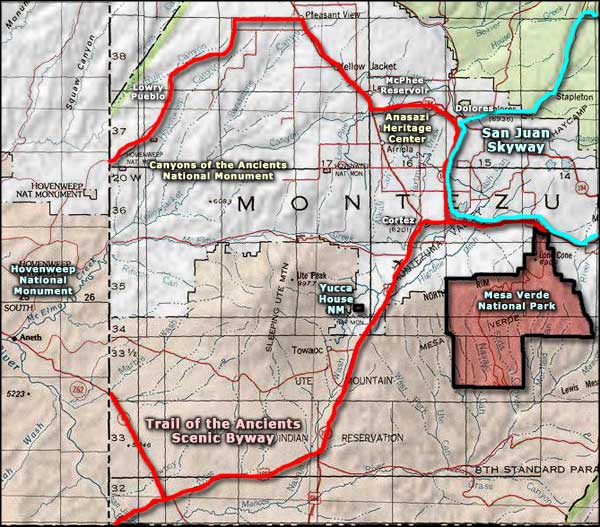
Trail of the Ancients Scenic & Historic Byway area map
